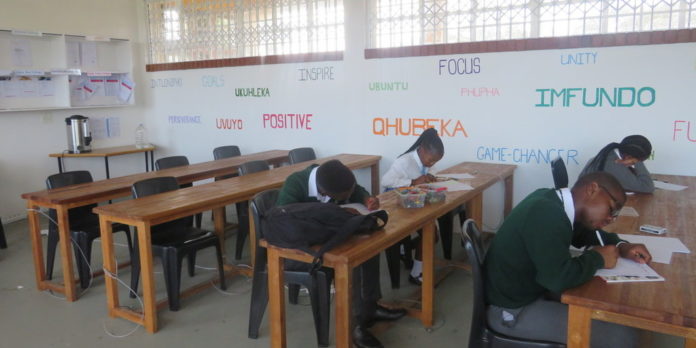Globally, the state of youth mental health and well-being is in the spotlight. There is a rising rate of mood and behavioural disorders, anxiety, and depression, as well as increases in suicide, self-harm, and substance abuse.
This has led to urgent worldwide calls for strategies and interventions that can help youth deal with prevalent mental health challenges.
According to 2021 WHO (World Health Organisation) data¹, it is estimated that 13% of the world’s 10- to 19-year-olds are affected by mental disorders, while other studies² report a particular pervasiveness of mental disorders amongst the youth of low- to mid-income countries of Sub-Saharan Africa.
Further to this, half of all adult mental health problems have their origins prior to age 14, and 75% by age 24 ³, making early prevention and promotion essential.
Programme Director of The Learning Trust, Zoe Mann says, “The upsurge of South African young people dealing with mental health conditions is alarming.
The majority of South African children are impacted by systemic poverty, high rates of violence and crime, as well as abuse and trauma in their communities. In addition to this, youth are still dealing with Covid-related grief, loss of family income, educational setbacks, and doubts regarding their future.”
The Learning Trust, a non-profit organisation that supports and helps develop a network of NGO community-based After School Programmes in South Africa, has joined forces with the Western Cape Provincial Youth and After School Programme Office as well as the Western Cape Branch of Community Chest to drive the third Lights On After School campaign (LOAS) in the country.
This annual commemoration, taking place on 20 October this year, aims to highlight the positive impact the after-school sector has on young minds.
This year, in light of Mental Health Awareness Month, the LOAS movement in SA hopes to drive the message of its 2022 theme ‘Celebrating After School Programmes supporting learner well-being and academic catch up’ by highlighting how the country’s after-school sector has an important role to play in not only improving learner success but also the mental and emotional well-being of school-going children and youth.
After School Programmes (ASPs) are diverse in their activities.
Some focus on academic and homework support, while others offer sports or enrichment activities to immerse vulnerable or at-risk learners in different experiences that enable socio-emotional learning.
Research has shown that engaging with caring adults in ASPs has wide-ranging positive impacts on youth, and can boost learning outcomes, open up study paths and encourage the sustainable adoption of healthy lifestyles.
In South Africa, ASPs are emerging as a force for good in our communities. For example, The School of Hard Knocks (SOHK), one of the ASPs in The Learning Trust network, combines the game of touch rugby with an international socio-emotional learning curriculum to reach more than 150 at-risk adolescent girls, as well as their teachers and caregivers.
SOHK CEO, Jon Hunter-Parsonage says, “The Lights On After School campaign is important to create awareness of how ASPs can engage with youth who are affected by trauma at a critical point in their young lives.
Early intervention is essential as young people’s brains are still developing, and no matter what they are going through, they have a better chance of recovering, growing through their experiences, and developing resilience than at any later stage of life. Good mental well-being, which goes hand-in-hand with developing coping mechanisms, is a gateway to a better future. It affects their performance in education, sets the scene for their relationships, and is the foundation for a healthy lifestyle.”
Increased well-being results in less learner drop-out
One of the well-recorded impacts of consistent participation in ASPs is lower school drop-out rates, which is highly relevant for South Africa in this post-Covid era as learning disruptions and setbacks are predisposing even more vulnerable youth than usual to giving up on school.
Mann says, “The country’s drop-out rates are around 40% which is astonishingly high when compared to global rates. ASPs help learners to develop self-esteem and experience a sense of belonging which are foundational to mental wellness. Supporting learners so that they can believe in themselves encourages them to stay in school.
Learners who drop out of school often do so because they have given up on themselves and their futures. Now is a critical time for catch-up interventions post-Covid.”
Another ASP supporting LOAS this year is Waves For Change, an organisation that harnesses the power of surf therapy. The programme works with over 2200 at-risk children at six different beach sites.
Founder and CEO, Tim Conibear says “ our most recent independent evaluation has shown that surf therapy measurably improves self-regulation, which is a bucket of functions that get negatively impacted when young people are continuously exposed to stress in childhood. A lack of self-regulation can lead to poor choices, such as substance abuse and risk of suicide. Our programmes help children build positive social attachments, practice emotional regulation skills and also develop confidence.”
In Gauteng, The Learner Advancement Group (LAG) is also emphasising the change-making efforts of ASPs in celebration of Lights On After School. They run a weekly Hearts and Minds Workshop nurturing the mental well-being of learners.
“We provide learners with practical tools to manage their thoughts and feelings. We encourage them to understand what worries them, to get to the root cause of any anger they may have, and we teach them how to set goals for themselves and their life,” says Mandla Ngcobo, Programme Director for LAG.
“ASPs are a lifeline for learners. Just showing up consistently in a learner’s life says that you care and that they matter,” concludes Mann.
Lights On After School 2022 in South Africa calls on ASPs, community and development programmes, donors and policy-makers, as well as interested businesses and individuals to participate in the campaign on 20 October 2022.
To get involved please visit www.enriched.co.za or www.thelearningtrust.org to donate to one or more of the programmes.
Supplied by: The Learning Trust


